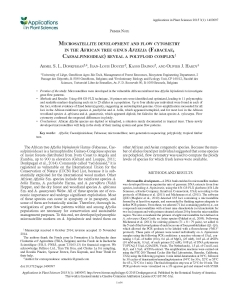Donkpegan A.S.L., Doucet J.L., Daïnou K., Hardy O.J.
The African tree Afzelia bipindensis Harms (Fabaceae, Caesalpinioideae) is a hermaphrodite Guineo-Congolese species of moist forests distributed from Ivory Coast to Angola and Zambia, up to 900 m elevation ( Gérard and Louppe, 2011 ; Donkpegan et al., 2014 ). Commonly called “red doussié,” it is registered as vulnerable on the International Union for the Conservation of Nature (IUCN) Red List, because it is substantially exploited for the international wood market. Other African Afzelia Sm. species include the rainforest species A. bella Harms, A. pachyloba Harms, and A. parvifl ora (Vahl) Hepper, and the dry forest and woodland species A. africana Sm. and A. quanzensis Welw. All of these species are of economic importance and undergo signifi cant exploitation. Most of these species can occur in sympatry or in parapatry, and some of them are botanically similar. Therefore, thorough investigations of gene fl ow patterns within and among Afzelia populations are necessary for conservation and sustainable management purposes. To this end, we developed polymorphic microsatellite markers on A. bipindensis and tested them on other African and Asian congeneric species. Because the number of alleles found per individual suggested that some species are polyploid, fl ow cytometry was used to compare the ploidy levels of species for which fresh leaves were available.
Consultez la notice complète de l’article sur ORBi

